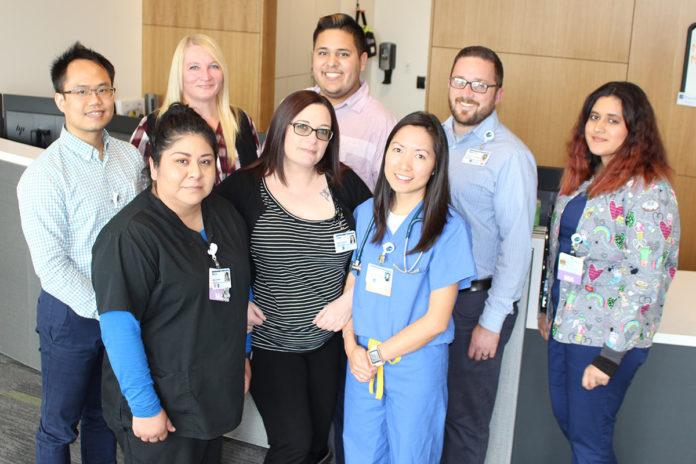
PeaceHealth Medical Group’s new clinic on 192nd Avenue in Camas is the first of its kind in the Columbia Network, which includes Clark and Cowlitz counties. The clinic, Union Station, is a hybrid model, drawing on the traditional aspects of primary care and in-network specialist referral, while at the same time working hard to meet consumer demand expectations.
The organization agreed to purchase ZoomCare, the Pacific Northwest on-demand health care chain of clinics, in late 2018. Over the last six months, PeaceHealth has launched three clinics that use elements of the ZoomCare approach: longer open hours, online scheduling and physician assistant care of acute illnesses and injuries. Unlike ZoomCare, patients can also utilize a walk-in clinic, choose a primary care doctor for chronic cases and make appointments over the phone. In the future, there will be the option of emailing providers directly for follow-ups.
The clinic opened in late summer 2019 with online and phone appointments for same-day care, along with a walk-in clinic. After placing three permanent providers on staff, one MD and two PAs, Union Station has officially launched to include an “ongoing primary care component,” said Dr. Christopher Wheelock, medical director for the Columbia Network, and it will host an open house for community members on Friday, Feb. 28.
Union Station was originally used primarily as overflow from the PeaceHealth Fisher’s Landing clinic. Wheelock said the clinic wants to be “flexible to all comers” and therefore offers several ways to access patient care, and you don’t have to be an established PeaceHealth patient to utilize the clinic’s services.
“The idea is to put care where people are. It’s right across from the Costco, across from Pacific Park,” he said. “When we launched, it was set up for you to be able to walk in, schedule online or call. We continue to have all three, added now is the primary care component.”
He said elements of ZoomCare’s model are utilized, but Union Station services are broader.
“ZoomCare is limited in scope. We’ll have the ability for patients to make an appointment with a specific provider for follow up and the ability for patients to email with their provider,” he said. “This model does fall in the middle, between a traditional primary care practice vs. just episodic care like ZoomCare does.”
“This is the first one that does have this model,” said Wheelock. “Future clinics going forward will likely have this model. This is the test case so to speak.”
PeaceHealth uses typical metrics to evaluate the success of a clinic, contracting with a national vendor to survey patients on various experiences, such as getting into the clinic and seen in a timely way and getting information the way they want to receive it. The clinic also looks at growth over time.
“We have seen a pretty consistent uptick in terms of visit volume, just for the episodic care over time,” Wheelock said.
Along with Union Station, Fairhaven Plaza Clinic in Bellingham, which opened last fall, and the Woodfield Station Same-Day Clinic in Eugene, which opened last summer, are all pilot programs for this new model in major PeaceHealth markets.
PeaceHealth has approximately 16,000 caregivers, a medical group practice with more than 1,100 providers and 10 medical centers serving both urban and rural communities throughout the Northwest. PeaceHealth has announced a string of layoffs over the last year, and the most recent hit PeaceHealth RiverBend in Springfield, Ore., in January. The Catholic health care chain based in Vancouver has been involved in a number of labor disputes recently.
Union Station operated as a same-day clinic for several months before adding primary care. The main reason was a lack of permanent staff.
“In an ideal world, we would have opened all things at the same time,” said Wheelock. “There is a lot of demand for primary care services right now.”






